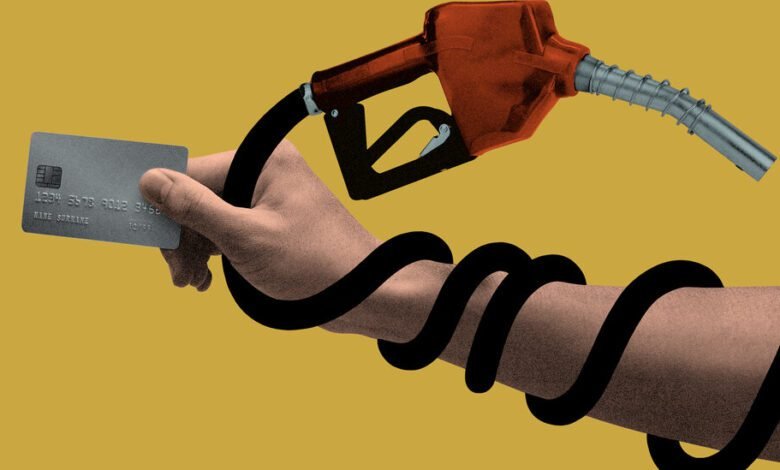Help! A gas station charged me $1,500 and my bank won’t believe it’s fraud.

Dear Stumbled,
Last October, my family spent a week in Todos Santos, on Mexico’s Baja California peninsula, for a wedding. Everything went well, but when I got back, I noticed an unusual charge on my credit card: $1,500.49, made the day we flew home from San José del Cabo to the United States. The merchant appeared to be a restaurant in Mexico City. I remembered that when we went to fill up the rental car at a Chevron station near the airport, the attendant put the card in a portable machine and then told me that it had been rejected, forcing me to use a second card. Nothing else unusual happened that day, and Google reviews of this gas station contain eerily similar accusations of fraudulent charges from other tourists. I disputed the accusation, but Wells Fargo repeatedly denied my claim, even when I asked the Better Business Bureau to intervene. You can help? Nate, Wayland, Massachusetts.
Dear Nate,
We can’t be sure that the fraud occurred at the gas station, but if so, it’s a clever fraud. The employee likely put your card through a fake card reader and charged you $1,500 just as you were rushing to return your rental car and catch a flight out of the country, knowing you were unlikely to report the crime to Mexican authorities. It’s a good reminder for travelers that we need to always be vigilant on vacation, even when we’re irritable, tired, stressed, or out of our element.
It’s also a good excuse to consider how dependent we’ve become on our credit card issuers to save the day in such situations. As you discovered, this doesn’t always happen.
Humor me as I consider the situation from the perspective of a bank like Wells Fargo. What may seem like obvious fraud when it happens to us is not necessarily a clear crime for a fraud complaints team tasked with separating its customers who are honest tourists from others who may be fraudsters themselves.
Since I trust you are in the former camp, I contacted Wells Fargo and shortly thereafter a representative contacted you by phone and agreed to refund the charge, plus interest. A week later, you received a check for $1,609.96.
“We take customer concerns seriously and seriously investigate all customer complaints,” company spokeswoman Jennifer Langan wrote in an email statement to me. “We worked directly with our client on this matter and it has been resolved.”
But, of course, it should have been resolved sooner and without my intervention. Was there anything you should have done differently? Was there anything Wells Fargo should have done differently?
The answers are yes and yes.
Although you explicitly gave Wells Fargo permission to discuss the incident with me, Ms. Langan told me that the company would not talk about the details of your case. But she dropped a hint, writing to me, that Wells Fargo encourages customers to take action “when they receive a fraud alert, a phone call, or correspondence about a transaction.”
So I asked you to look at your phone and email messages with Wells Fargo at the time of your trip, and the bank sent you a fraud alert, via text message, around the time of the transaction. You said you didn’t receive it at the time because you weren’t able to receive messages while you were in Mexico. And somehow you missed it when you got home.
While I encourage everyone to unplug while traveling, I will henceforth recommend an exception for text messages so you can monitor your credit card transactions. (You might even consider alerting your bank whenever a transaction occurs, even if it’s not suspicious, which can also be useful for monitoring the exchange rate you’re getting.)
What happened to Wells Fargo that caused them to reject your claim multiple times? While we were unable to obtain specific details from Ms. Langan, we know exactly what the Wells Fargo representative said, as you recorded the call with her permission.
The agent said it was “normal procedure” for Wells Fargo fraud teams to deny allegations of fraud if a chip card was in the owner’s possession at all times, which you said it was. But technically speaking, that was incorrect: the card was briefly out of his hands when the gas station attendant picked it up and inserted it into a portable machine in his car window.
OK, so you didn’t see the text alert and didn’t properly analyze what exactly “in your possession” meant. But given his continued pleas and the online reviews of the gas station and others in the area that corroborate his account, it’s disappointing that Wells Fargo has continued to be so stubborn.
The representative you spoke with admitted that the team that worked on your case could have done better. “We will try to review our procedures,” she said, noting that she guided the person who made the decision on how to do “better and more complete research.”
That’s good to hear, although I would feel more confident if I had heard it directly from an official company source rather than a recorded call.
Here’s another piece of advice for travelers as mobile card readers become the default payment method in many places: When possible, order the machine and insert (or tap) the card yourself, watching the screen carefully. In much of the world (although, for some reason, not in many American restaurants), the days of a merchant taking your card back to run it through a machine (and potentially a skimmer to steal your information) are long gone. .
While you may have been reasonably frustrated with Wells Fargo, let’s be clear here. The real villains are those who committed this crime in the first place and who somehow, whether at the gas station or elsewhere, managed to charge $1,500 to a company called Comida Corrida in distant Mexico City.
I contacted Horizon Group, which operates the Chevron Emerald gas station you visited, as well as dozens of Chevron stations in the states of Baja California Sur and Sinaloa.
Gilberto Gómez, the company’s business director, responded by email, saying he was not aware of such issues and encouraged him to send him details. “We take monitoring this type of complaint very seriously and meticulously,” he wrote in Spanish. “If there is any harm to our customers attributable to the gas station, we will resolve it.” (I gave you his email address and you told me you would contact him.)
But considering the Google reviews at this location and several other (non-Chevron) gas stations in the area, I’m skeptical that the Horizon Group isn’t aware of the problem. Gómez didn’t respond when I asked twice if he had seen the Google reviews.
I also contacted the Los Cabos Tourism Board. When its managing director, Rodrigo Esponda, responded to me, he said he was “deeply concerned about the situation” and had spoken to the Baja California Sur state attorney’s office, who told him it was investigating the matter. He also recommended that tourists who have complaints about a business in the region file them with Mexico’s federal consumer protection agency, Profeco.
However, could the solution be to simply pay cash at gas stations in the Cape area? Unfortunately, no: there are also reports of gas station attendants exchanging large bills that customers pay for smaller ones and demanding more. And don’t even get me started on the Tripped Up complaints that crop up about the poor customer service travelers encounter at car rental agencies near Mexican beach destinations. The best solution for sun seekers may be to skip renting a car altogether and hire a driver, use car-sharing services, or use public transportation.
If you need advice on a better-laid travel plan gone wrong, email TrippedUp@nytimes.com.
Follow the New York Times travels about Instagram, Twitter It is Facebook. AND sign up for our weekly Travel Dispatch newsletter for expert tips on how to travel smarter and inspiration for your next vacation.




